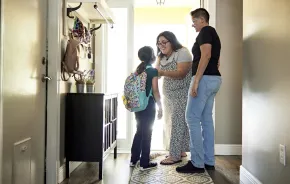
All newborns need the same things, and most parents deal with a fairly standard set of developmental questions. But families of color face additional layers of concern that are rarely discussed. “It’s so important to have this space for our families who are Black, Native, Latinx, API and mixed race. By default, race is an integral part of who we are. Every parent of color has gone through experiences that shape our racialized identity. Navigating all that is very lonely for parents who are not connected to others,” says Christine Tang, executive director of Families of Color Seattle, known more familiarly as FOCS.
FOCS (pronounced “folks”) was started nearly a decade ago by Amy Pak, a Seattle mom who was looking for connection with other families of color. While there were lots of resources for new parents, there weren’t many spaces for parents to specifically talk about raising children of color with a strong and healthy sense of identity. Those initial conversations among a few Seattle families grew into the regional nonprofit FOCS. Today their programs include parent groups, community events and racial equity consulting.
“We exist to support all families of color in Seattle and beyond, from Everett to Federal Way and the Eastside,” says Tang.
Parent support groups
FOCS started with parent groups, and parent groups remain at the heart of their work. Today, dozens of parent educators lead affinity groups through curriculum-based gatherings where parents learn from topical experts and discuss their own experiences and feelings related to race and parenting.
Gloria Okada, whose children are now 8 and 5 years old, participated in one of the first FOCS parent groups. FOCS filled a need that wasn’t being met elsewhere — her friends didn’t have kids the same age and her PEPS group was more focused on practical day-to-day care topics.
“At FOCS, people talk about their own lived experiences as people of color, and about how it might influence how they will raise their own children,” says Okada. “We share what our parents did — and didn’t do — that we might want to carry forward.”
Although each parent group only runs for a couple of months, many of the participating families form more lasting bonds, keeping in touch and even getting together years later. Okada is still in contact with parents from her group, and she continues to work with FOCS as a parent educator. She says the organization has stayed true to its original intent, but the focus has shifted in response to community needs.
“We use the acronym RICE. It used to stand for race, identity, culture and ethnicity. Today we say it stands for race, identity, community and equity.”
Structurally, the parent affinity groups operate much like a PEPS group. FOCS parent groups have children roughly the same age and live in the same general neighborhood. They also hold facilitated discussions over the course of eight to 10 weeks in members’ homes. (As a result of COVID-19, meetings are now held via Zoom.) But FOCS still fills a need that no one else is addressing.

“What’s nice about FOCS is that you don’t have to make an agenda item to create space for talking about race, because as people of color, everyone is already thinking about it,” says Chris Colley, who recently completed a FOCS South Seattle Newborns group.
“We know that families of color, and especially Black families, have been emotionally impacted by COVID and the events related to protest,” says Tang. After the killing of George Floyd, some groups have incorporated group therapy sessions into their schedule. But as always, the program is tailored to what the community wants.
Colley’s group had a discussion about whether and how families could participate in protests, but more often they chose to keep FOCS as a space to take a break from what’s going on outside the “newborn bubble” and focus on family.
Like many other people, Colley’s thoughts about race changed with marriage and parenthood. When his first child was born, he joined a PEPS group, where, he says, “I was the diversity.” When his second child was born, he joined FOCS.
“As a mixed-race person, I’ve had some anxiety about these spaces. Do I have enough color to be part of this group?”
Colley found that he did fit in with the diverse demographics of his FOCS group, which included several multiracial families. “I appreciate that FOCS is inclusive of all families of color,” he says. “It’s really affirming for me as a mixed-race parent.”
That inclusivity is critical to the organization’s mission of building an equitable, just and loving community for children of color. FOCS’ programs serve any family raising a child of color, including parents of any race raising mixed-race or transracially adopted and foster children.
Family programs
“Our programming is evolving over time for what the community says they need,” says Okada. Besides the parent groups, FOCS hosts family events. Usually these are drop-in gatherings for the whole family, organized around a special topic. During the pandemic, these events have moved online. For the time being, lessons in Spanish and mindfulness have largely been replaced by topics related to grief and racial trauma, and dealing with the financial fallout of the pandemic.
Structural change
“Especially now, it’s more than just connecting with other families and raising children with strong identities. It is also what kind of world am I responsible to pass on to them,” says Tang. To help with structural change, FOCS provides consulting services to schools and employers. They also offer advocacy workshops on equity, intersectionality and engaging with families of color.
Getting involved
“I often hear from parents, ‘I wish I knew about FOCS when I had my baby,’” says Tang. She hopes that in time, FOCS more new parents will hear about FOCS. But in the meantime, even families with older kids can access family resources online; attend or suggest a topic for a family event; or become part of a parents group for families with older kids.











